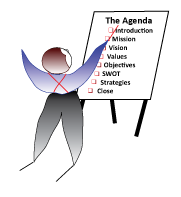April 2020 - The FoCuSed™ Facilitator eNewsletter

Why Hire a Trained Group Failitator, by Gary Rush, IAF CPF | Master
I’ve written about why a Group Facilitator should strive to achieve a professional certification and the difference between a professional certification and a certificate of completion. This time, I’m writing about why it’s important to hire a trained Group Facilitator.
This article was triggered because I’ve read quite a few articles about remote meetings and remote facilitation describing the technology and ways to ensure that the meetings are inclusive and productive. The thing that stood out to me was that the articles focused mostly on which technology to use and how to use it rather than on the most important aspect of a meeting (whether the meeting is remote or face-to-face) – “how to” design and conduct the meeting, which is the key difference between running a meeting and facilitating a meeting.
Listing the topics to be discussed is not a process and quite ineffective. Meetings require a structured thought process behind the agenda steps along with “how to” engage the attendees to achieve a supported outcome. That is what a trained Group Facilitator brings to the table.
Does it make a difference? Yes, Group Facilitators are trained to know “how to” design the meeting process, “how to” engage the attendees, and “how to” achieve a supported outcome. Facilitating is a skillset just as project management and business analysis are skillsets. Meetings led without proper Group Facilitator training can cost an organization millions of dollars in poorly run meetings. Ensuring that you have a trained Group Facilitator facilitating your meetings saves money and improves productivity.
How do I know this is a trained Group Facilitator? Ask who trained him or her. There are those who call themselves “Facilitators” because they work well with others – that’s not adequate because facilitation is a defined skillset that is learned through proper training. Group Facilitators spend a great deal of effort learning these skills. You need an understanding of the “why”, practical applicable techniques, and structured thought processes in order for this skillset to be effective. A trained Group Facilitator will prepare by developing a plan to ensure engagement to reach a supported outcome. The ability to bring people together and accomplish good work is a learned skillset that benefits the greater whole.
So, when conducting a meeting, whether it’s remote or face-to-face, look first to “how to” design and conduct the meeting and, ensure you hire a trained Group Facilitator – it makes a big difference. ![]()
PS: The International Association of Facilitators (IAF) is the primary industry association for Facilitators. They have a list of Facilitators on their website who have experience and have been assessed against the IAF Core Facilitator Competencies achieving the designation of Certified Professional Facilitator (CPF).

